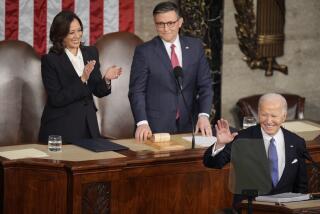Is two more hours of Dubya two too many?
Here’s your Stetson, what’s your hurry? Americans can’t wait to see the back of George W. Bush. Will they feel the same about him at the box office?
Oliver Stone’s latest film, “W,” is a chancy three-bank shot: a movie about a living president, who is still in office, opening two weeks before the election to replace him. Is a man who’d be toxic at the ballot box going to be poison at the box office? If we’re sick of him after eight years in the White House, will we want to spend another two hours with a version of him in a movie house?
I asked Stone on KPCC radio about this tightrope, and he said that as far as he’s concerned, “there’s no judgment” in his film. “As a dramatist I’m telling a story, and I wanted to walk in his shoes. I think he’s affected our lives forever, stronger even than Reagan and Nixon did in my life.”
I saw “W” this week. It spends its time on the Iraq war and on Bush’s formative years, and insofar as I could detach myself from my dislike of the man, I found myself feeling fleetingly sorry for him, but a whole lot sorrier for us. “W” pulled punches that I desperately wanted to connect, and if comedy equals tragedy plus time, “W” shows it’s too soon to laugh and too late to do anything but endure the tragedy of this administration.
Will it influence voters? “Poppy” Bush points out in the film that Dubya has now screwed it up for any other Bush White House dreams. Whether he’s also done it for a Republican successor, that’s what Nov. 4 is for.
When it comes to “W,” who’s sticking up for Bush?
No one has chased the movie down, the way the 2003 TV docudrama about the Reagans was chased from CBS to Showtime by the Fox hounds. The McCain camp won’t mount a fight, lest it remind voters of how close John McCain’s record is to Bush’s agenda. And if the White House cries foul, it’s hollering into the wind. Bush couldn’t even muscle congressional Republicans into line behind the country’s heftiest economic legislation in 75 years. Why should anyone listen when it comes to a $10 movie ticket?
Americans already don’t much like politics in film. A movie about a Chihuahua just pooped on two political comedies, Bill Maher’s anti-fundamentalist “Religulous” and David Zucker’s anti-liberal “An American Carol.”
You’d think that politics (one of the most powerful forces in human society) and movies (the most powerful medium since movable type) would be made for each other. Not in this country, anyway.
In 1933, a month after FDR’s inauguration, Walter Lippmann deigned to come West to see one of my favorite political potboilers, “Gabriel Over the White House,” in which a party hack president has an epiphany after a car crash and sets out to fix the world.
The Sage of Washington essentially patted Hollywood on its pretty head and told it not to bother about politics: “As a sample of what the movies can do for the political education of mankind, ‘Gabriel’ is not so promising. The truly educative process consists of learning to deal with reality ... not the mere projection of one’s wishes.”
Steven J. Ross is a USC history professor who teaches film and popular culture. “Americans,” he told me, “don’t want didactic films, and they don’t want didactic politics in films. They’re going to the movies to be entertained. If politics come up in the course of entertainment, they’ll accept it, but [not] if they’re hit over the head with strong ideological points of view.”
So the best political films don’t tip their hand, said Ross. “The Best Years of Our Lives,” from 1946, is about ordinary families and, by stealth, about the home-front consequences of war. It was a hit.
John Wayne’s “The Green Berets,” a rare real-time film about Vietnam, didn’t do much better at the box office then than the current films about Iraq.
Even when an overtly political film has a good plot, character and storytelling -- Ross singled out Warren Beatty’s “Bulworth” -- it can lose by winning because its mission is to make audiences uneasy, and if it succeeds, audiences can resent it.
That sounds to me like we’ll take a nano-dose of politics if it’s camouflaged in whimsy and sentiment -- think “The Great Man Votes” or “Swing Vote” or even “Mr. Smith Goes to Washington” -- but we can’t drink it straight up and 200 proof.
Political films, like political books, are most eagerly welcomed in societies that repress free speech. Here, where you can say anything about anybody, there’s not much thrill -- or appetite -- when it comes to political boldness. And that means that whatever the critical verdict on “W,” there’s a strong chance it’ll still get drowned out in the prop wash of that Chihuahua movie.
More to Read
A cure for the common opinion
Get thought-provoking perspectives with our weekly newsletter.
You may occasionally receive promotional content from the Los Angeles Times.







